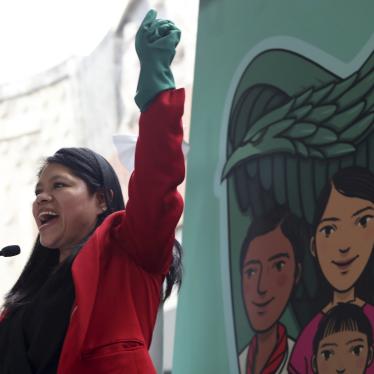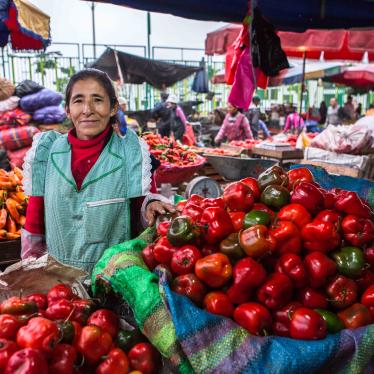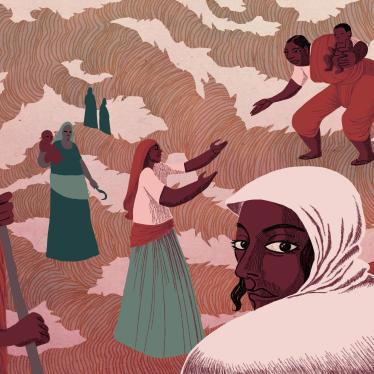(Paris) – France, which intends to play a leadership role on gender equality globally, should accelerate measures to end gender-based violence and harassment at work in its own country, Human Rights Watch said today.
On December 15, 2020, Human Rights Watch opened a campaign urging France to fight sexual harassment and violence at work by hastening its ratification of the 2019 International Labour Organization (ILO) Violence and Harassment Convention and by carrying out related domestic reforms. The French government should work in close consultation with workers’ organizations and employers to review national protections and identify reforms needed.
“Ratifying the ILO Violence and Harassment Convention is a great way for President Macron to translate France’s commitment to be a global champion for gender equality into practice,” said Nisha Varia, women’s rights advocacy director at Human Rights Watch. “The French government should quickly open a dialogue with social partners, including workers’ groups and employers, to ensure that ratification is accompanied by concrete change in national law and practice.”
France was among the first countries to pledge to pursue ratification when the treaty was adopted on June 21, 2019, and the labor minister reiterated this commitment on November 25, 2020. France is a co-host of the Generation Equality Forum, which seeks to set an ambitious 10-year agenda and accountability framework for gender equality.
Unions and civil society groups, including Confédération Française Démocratique du Travail (the French Democratic Confederation of Labour, CFDT), Confédération Générale du Travail (the General Confederation of Labour, CGT), Action-Aid Peuples Solidaires (ActionAid France), and CARE France, have been campaigning to urge speedy ratification and corresponding national reforms.
These include introducing workplace protections for domestic violence survivors and ensuring that multinational companies address violence and harassment in their supply chains. CARE has noted that several French businesses have announced their support for the treaty, including L’Oréal, BNP Paribas, BBDO France, Sodexo, and Kering.
France prohibits sexual harassment in both its criminal code and its labor code. Human Rights Watch noted that a national legal review would provide greater clarity on how France’s legal framework aligns with both the ILO treaty’s minimum standards, the guidance in its Recommendation 206, as well as its emerging best practices.
The Covid-19 pandemic highlights the importance of the convention’s standards. Job loss and economic recession place pressure on workers desperate to keep their jobs, making it harder for them to speak out against abuse. In France, the pandemic contributed to a 36 percent increase in reported domestic violence cases during the lockdown restrictions between March and May 2020. The convention and its accompanying Recommendation 206 have guidance for employers and governments on protections, so that gender-based violence survivors, including domestic violence victims, can take steps to ensure their safety without fear of losing their jobs.
A June Human Rights Watch report highlights the main obligations for governments set out in the treaty, and elements of national laws and policies that reflect promising practices. Countries that ratify agree to align their national laws to the treaty’s standards, and the ILO will periodically review their compliance.
A 2020 World Bank report found that 50 out of 190 economies had no specific legal provisions prohibiting sexual harassment in employment. Human Rights Watch has documented violence and harassment at work around the world, including in agriculture, domestic work, education, fishing, the garment industry, health, journalism, mining, public office, and the military.
The treaty requires governments to uphold comprehensive national laws against harassment and violence at work, and to prevent abuses with information campaigns and special measures for high-risk sectors. It also requires enforcement – such as inspections and investigations – and access to remedies for victims, including complaint systems, whistleblower protections, services, and compensation.
Uruguay, Fiji, and Namibia were the first three countries to ratify the treaty, and both houses of Argentina’s congress have approved ratification legislation, which will now go to the president for signature. Several other countries including Belgium, France, Finland, Iceland, Ireland, Italy, the Philippines, South Africa, and Uganda have expressed their willingness to ratify.
More than three years ago, the longstanding fight against gender-based violence achieved a new public profile when the #MeToo hashtag, coined by the United States activist Tarana Burke, went viral. Millions of people from around the world have spoken out to disrupt the status quo, spark public discussion, and mobilize for change.
“Ensuring women’s personal safety at work is not a back burner issue and requires priority attention from governments, employers, and the public,” Varia said. “In 2021, conditions are ripe for accelerated action, and we urge everyone to do their part to move the #MeToo movement forward.”
Additional information about the ILO Violence and Harassment Convention. The treaty:
- Covers workers, trainees, workers whose employment has been terminated, job seekers, and job applicants, among others, and applies to both formal and informal sectors, public and private.
- Includes a requirement to address violence and harassment involving third parties, such as clients, customers, service providers, patients in health care settings, or students in education settings.
- Recognizes that violence and harassment go beyond the physical workplace and includes other activities related to work, such as commutes and offsite work events.
- Obliges governments to ensure that employers have workplace policies and prevention measures addressing violence and harassment.
- Requires countries to identify sectors of work and work arrangements that leave workers more vulnerable to violence and harassment, such as domestic work, garment work, and precarious employment, such as short-term contracts and the gig-economy.
- Addresses gender-based violence specifically, including the intersection of domestic violence and work, and the steps governments should take, including protections so that domestic violence survivors can seek help without losing their jobs.








